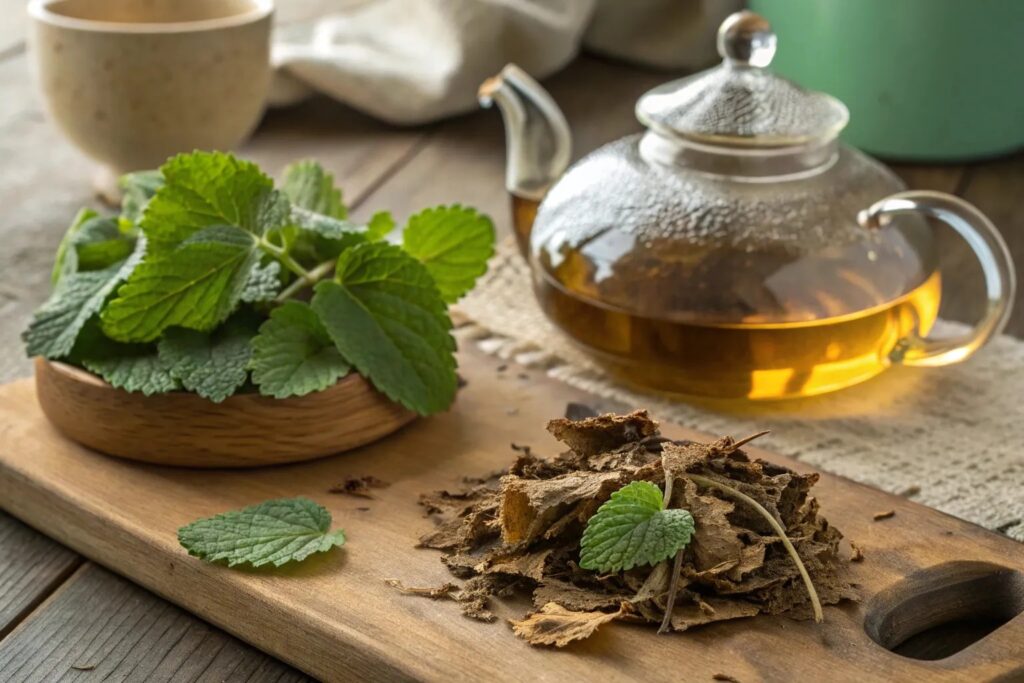If you’re looking for a gentle, natural way to shed stubborn pounds without crash diets or intense workouts, lemon balm tea for weight loss might just be your new go-to remedy. This calming herbal tea—known for its stress-relieving powers—is now gaining traction as a weight loss secret. Made from the lemon-scented herb Melissa officinalis, lemon balm tea helps soothe the body and support fat-burning metabolism, especially when sipped at bedtime.
In this article, we’ll explore exactly how lemon balm tea works for weight loss, how to make the perfect brew, and the best times to drink it. We’ll also look at its calorie content, its safety for daily use, and how it compares to other herbal weight loss teas. Plus, we’ll answer your most asked questions about this powerful yet gentle herb.
Check out this calming turmeric ginger latte recipe if you’re into herbal drinks with wellness benefits.
PART 1: Introduction to Lemon Balm Tea for Weight Loss
What Is Lemon Balm Tea?
Lemon balm tea is a herbal infusion made from the leaves of the Melissa officinalis plant—a member of the mint family. Though often used for calming nerves or easing digestion, this tea is now making waves in the wellness world for its ability to support weight loss. The plant itself has a soft citrus scent and flavor, which makes the tea both tasty and refreshing.
You can prepare lemon balm tea using either fresh or dried leaves. The process is simple, but the health benefits are powerful. This tea contains compounds like rosmarinic acid and eugenol, which support antioxidant activity, reduce inflammation, and help calm the nervous system. Combined, these effects make it a perfect nighttime brew for weight-conscious tea lovers.
Why Lemon Balm Is Trending for Natural Weight Loss
So, why is lemon balm tea showing up in weight loss forums and diet blogs? One big reason: stress and sleep quality are closely tied to weight gain, especially in the belly area. Lemon balm tea naturally supports better sleep and reduces cortisol levels (your stress hormone), which can help prevent stress-induced weight gain.
Additionally, preliminary studies and anecdotal evidence suggest that lemon balm may influence appetite regulation and promote digestion. People who drink it regularly often report reduced bloating, better sleep, and a calmer mood, all of which can indirectly contribute to shedding extra pounds.
Discover great ideas like the pink salt weight loss recipe that also supports your natural slimming journey.

Lemon Balm Tea Recipe for Weight Loss
A soothing, zero-calorie herbal infusion made from lemon-scented Melissa officinalis that calms stress, supports deep sleep, and gently boosts nighttime fat metabolism—perfect for a bedtime slimming ritual.
- Total Time: 3 minutes
- Yield: 1 serving 1x
Ingredients
- 1½ cups filtered hot water (just under boiling)
- 1 tablespoon dried lemon balm or ¼ cup fresh lemon balm leaves, lightly crushed
- Optional flavour boosters: 1–2 tsp fresh lemon juice, 2–3 thin ginger slices, or 1 cinnamon stick
Instructions
- Add lemon balm to a mug, infuser, or teapot.
- Pour the hot water over the herbs, cover, and steep for 8–10 minutes (up to 15 minutes for a stronger bedtime brew).
- Strain, then stir in any optional flavour boosters.
- Sip warm about 30 minutes before bed to aid relaxation and overnight metabolism.
Notes
Drink 1–2 cups daily for 2–3 weeks, then take a 1-week break. Avoid within 4 hours of thyroid medication. For a refreshing daytime version, chill the strained tea over ice.
- Prep Time: 3 minutes
- Cook Time: 0 minutes
- Category: Herbal Tea
- Method: Steep
- Cuisine: Wellness
Nutrition
- Serving Size: 1 cup
- Calories: 1
- Sugar: 0g
- Sodium: 2mg
- Fat: 0g
- Saturated Fat: 0g
- Unsaturated Fat: 0g
- Trans Fat: 0g
- Carbohydrates: 0g
- Fiber: 0g
- Protein: 0g
- Cholesterol: 0mg
Keywords: lemon balm tea for weight loss, bedtime tea, calming herbal tea, stress relief tea
PART 2: How Lemon Balm Tea Aids Weight Loss
The Science Behind Lemon Balm’s Fat-Burning Effects
When it comes to losing weight naturally, it’s not just about cutting calories—it’s also about regulating hormones and supporting your body’s internal systems. Lemon balm tea for weight loss offers subtle but real effects through its influence on stress, digestion, and metabolism.
Scientific studies have shown that compounds in lemon balm—especially rosmarinic acid and citronellal—act as mild sedatives and anti-inflammatories. These properties help reduce cortisol levels in the body, which is crucial because high cortisol is linked to belly fat retention and slow metabolism.
Even more interesting? Lemon balm appears to have a mild hypolipidemic effect, which means it can help lower triglyceride levels. That means your body is more efficient at processing fat and less likely to store excess as body weight.
Lemon balm may also regulate blood sugar spikes, reducing cravings and mood-based eating. Combined, these effects create a gentler but sustained fat-burning environment in the body—without any harsh stimulants.
Hormonal and Metabolic Impacts of Lemon Balm
Weight loss isn’t just about food; it’s about balance. Lemon balm targets key hormones that affect hunger, sleep, and fat storage.
- Cortisol: Lemon balm’s natural calming effects help lower cortisol levels, which supports belly fat loss.
- Insulin: It may indirectly regulate insulin sensitivity, reducing the risk of sugar cravings and emotional eating.
- Melatonin: Lemon balm enhances sleep quality, which triggers natural metabolic repair and fat oxidation during the night.
If you’re struggling with emotional eating or plateauing despite diet and exercise, you may be dealing with underlying hormonal imbalances. That’s where drinking lemon balm tea at night can support your system in a way many diet teas can’t.
Looking for inspiration? Try this bariatric tea recipe for weight loss for another gentle fat-burning beverage idea.
PART 3: Best Lemon Balm Tea Recipe for Weight Loss
Simple Fresh Lemon Balm Tea Recipe
Making your own lemon balm tea for weight loss at home is easy and affordable. If you have fresh lemon balm growing in your garden or on your kitchen counter, you’re just minutes away from a relaxing and slimming cup of tea.
Ingredients:
- 1 handful of fresh lemon balm leaves (about ¼ cup)
- 1½ cups of filtered hot water
- Optional: squeeze of lemon, 1 tsp raw honey, or cinnamon stick (for flavor only)
Instructions:
- Rinse lemon balm leaves thoroughly under cold water.
- Lightly crush them using your fingers or a spoon to release natural oils.
- Place them in a heatproof mug or teapot.
- Pour hot (not boiling) water over the leaves.
- Cover and let steep for 7–10 minutes.
- Strain and enjoy while warm.
Note: Avoid boiling the leaves directly as high heat can destroy some of the active compounds. For stronger calming effects at night, you can steep for up to 15 minutes.
This fresh version retains the most antioxidants and essential oils, which are believed to play a role in calorie regulation and fat breakdown. It also works well as a bedtime tea for weight loss, helping ease you into sleep while supporting metabolic repair overnight.
Check out this dense bean salad recipe if you’re looking for a weight-friendly side dish to pair with your tea.
Dried Lemon Balm Variation & Brew Time
No fresh leaves on hand? Don’t worry—dried lemon balm is just as effective and even more convenient for daily use. You can find it in health stores or buy organic bulk packages online.
Dried Lemon Balm Tea Recipe:
- 1 tablespoon dried lemon balm
- 1½ cups of hot water
- Optional add-ins: ginger slices, fennel seeds, or a splash of apple cider vinegar
Instructions:
- Add dried lemon balm to a tea infuser or straight into your mug.
- Pour hot water over the herbs.
- Cover and steep for 8–12 minutes.
- Strain and enjoy.
Dried leaves are more concentrated, so you don’t need as much. This version stores well and is perfect for batch-brewing. Plus, it makes a great base for detox tea blends if you’re mixing in other metabolism-boosting herbs like peppermint or green tea.
Don’t miss our vegan protein dense bean salad to balance your meal with plant-based protein.
PART 4: When and How to Drink Lemon Balm Tea
Best Time to Drink It: Morning vs. Bedtime

If you’re sipping lemon balm tea for weight loss, timing matters. While it’s a flexible herbal tea that can be enjoyed anytime, your goal determines the best time to drink it.
Morning:
- Great for stressful or anxious mornings
- Helps reduce cortisol buildup before it affects metabolism
- Combine with light breakfast or a healthy fat-burning smoothie
Bedtime:
- Ideal for weight loss support during rest
- Enhances deep sleep and fat oxidation overnight
- Works best when consumed about 30 minutes before bed
Many herbalists and holistic nutritionists recommend drinking lemon balm tea twice a day—once in the morning to support digestion and balance stress, and again at night to promote restorative sleep, which is crucial for weight loss.
This tea also pairs well with a light dinner. Avoid drinking it immediately after a heavy or fatty meal, as it may dilute digestive enzymes.
Looking for a feel-good meal to go with your tea? Don’t miss our comforting lasagna soup bowl recipe that’s light enough for dinner.
Daily Dosage and Long-Term Use Guidelines
While lemon balm is generally considered safe, moderation is key. Here’s a simple dosage guide for optimal benefits:
| Use Type | Frequency | Amount |
|---|---|---|
| Occasional Use | 1–2x/week | 1 cup/day |
| Regular Use | Daily | Up to 2 cups/day |
| Nighttime Sleep Support | Nightly | 1 cup before bed |
Pro Tips:
- Cycle your intake: Drink for 2–3 weeks, then take a one-week break.
- Don’t exceed 3 cups/day—too much may lead to drowsiness or low blood pressure in sensitive individuals.
- Avoid taking it with other sedative herbs unless guided by a healthcare provider.
For variety, try rotating it with other gentle slimming teas like hibiscus or peppermint. Explore this refreshing watermelon limeade as a midday hydrating option.
PART 5: Comparing Lemon Balm Tea with Other Weight Loss Teas
Lemon Balm Tea vs. Green Tea, Chamomile, and Peppermint
There are dozens of teas marketed for weight loss, but not all work the same way—or as gently—as lemon balm tea for weight loss. Let’s break down how it compares to a few popular options:
| Tea Type | Primary Benefit | Energy Level | Best Use Time | Notable Compounds |
|---|---|---|---|---|
| Lemon Balm | Calms nerves, improves sleep, balances hormones | Low | Bedtime | Rosmarinic acid, eugenol |
| Green Tea | Boosts metabolism, fat oxidation | Moderate | Morning/afternoon | EGCG, caffeine |
| Chamomile | Reduces stress, supports digestion | Low | Night | Apigenin, antioxidants |
| Peppermint | Eases bloating, supports digestion | Low | After meals | Menthol, flavonoids |
Why Lemon Balm Wins for Long-Term Fat Loss:
- Green tea may rev up metabolism short-term, but its caffeine content can affect sleep and lead to jitters.
- Chamomile is soothing but lacks the metabolic impact of lemon balm.
- Peppermint is great post-meal but doesn’t influence cortisol or sleep hormones like lemon balm does.
Lemon balm offers a perfect balance of hormonal regulation, sleep support, and mild digestive aid—making it ideal for sustainable weight loss, especially if you’re dealing with stress-related cravings or belly fat.
If you like gentle, belly-calming teas, check out our cozy creamy corn pasta with coconut milk—a comfort meal that won’t derail your goals.
Pros and Cons of Each for Belly Fat Reduction
| Tea Type | Pros | Cons |
|---|---|---|
| Lemon Balm | Supports sleep, reduces cortisol, eases bloating | May cause drowsiness if overused |
| Green Tea | Proven fat-burning benefits, antioxidant-rich | May cause anxiety or upset stomach |
| Chamomile | Improves digestion and sleep quality | Mild effect on metabolism |
| Peppermint | Soothes stomach, relieves gas | Limited effect on fat metabolism |
The key is not choosing just one—but using lemon balm tea at strategic times, like bedtime, while enjoying other teas during the day to complement your overall wellness strategy.
PART 6: Nutritional Value and Calories in Lemon Balm Tea
Does Lemon Balm Tea Have Calories?
If you’re counting every calorie while trying to slim down, here’s some good news—lemon balm tea has virtually zero calories. When brewed with just water and plain lemon balm leaves, the drink is entirely free from sugar, fat, and carbs. That makes it an ideal companion for intermittent fasting, low-calorie diets, or keto-based plans.
Here’s the nutritional breakdown for one 8 oz (240 ml) cup of plain lemon balm tea:
| Nutrient | Amount |
|---|---|
| Calories | 0–2 |
| Total Fat | 0 g |
| Carbohydrates | 0 g |
| Sugar | 0 g |
| Protein | 0 g |
| Caffeine | 0 mg |
Keep in mind, the nutritional values change slightly if you add sweeteners like honey or fruit. While a teaspoon of raw honey can offer extra antioxidants, it also adds about 20 calories per cup. If you’re drinking lemon balm tea for weight loss, go light on any add-ins.
Need a snack that won’t mess with your calorie count? Try our fiber-rich dense bean salad variations that pair well with herbal teas.
Add-Ins That Preserve Weight Loss Benefits
You don’t have to drink lemon balm tea plain—just be smart about what you add. Here are flavor boosters that maintain or even enhance your tea’s slimming effects:
| Add-In | Effect on Weight Loss | Use Amount |
|---|---|---|
| Lemon juice | Detoxifying, boosts metabolism | 1–2 tsp |
| Ginger slices | Anti-inflammatory, appetite control | 2–3 thin pieces |
| Apple cider vinegar | Aids digestion and blood sugar | ½ tsp |
| Ceylon cinnamon | Balances blood sugar | 1 stick or ¼ tsp powder |
| Fennel seeds | Reduces water retention | ½ tsp |
Avoid processed sweeteners, flavored syrups, or milk-based creamers. These can negate the calorie-free benefit of the tea and reduce its effectiveness as a bedtime tea for weight loss.
PART 7: Lemon Balm Weight Loss Benefits Beyond the Scale
Reducing Bloating and Water Retention
While lemon balm tea for weight loss is often praised for its calming and metabolic effects, one of its unsung powers lies in debloating. If you’re someone who feels puffy after meals or wakes up feeling bloated, lemon balm can offer soothing relief.
Here’s how:
- Acts as a natural diuretic, helping your body flush out excess water.
- Eases gastrointestinal inflammation, which reduces abdominal swelling.
- Soothes gas buildup, thanks to its mild antispasmodic properties.
The result? A flatter stomach, better digestion, and reduced bloating—all without the need for harsh detox teas. Many users report noticeable changes in their waistline within just a few days of daily use.
Looking for a delicious, fiber-packed side to support gut health? Try this easy spinach ranch dip with raw veggies instead of chips.
Sleep, Cortisol, and Belly Fat Connection
We can’t talk about weight loss without talking about sleep and stress—two of the biggest silent saboteurs of your slimming journey. Lemon balm tea targets both by gently lowering cortisol, your primary stress hormone.

High cortisol has been linked to:
- Increased belly fat storage
- Insulin resistance
- Nighttime sugar cravings
Drinking lemon balm tea in the evening not only helps you sleep deeper but allows your body to enter fat-burning mode during rest. That’s right—good sleep equals better metabolism. And lemon balm creates the right conditions for this to happen naturally.
One cup before bed can:
- Help you fall asleep faster
- Improve sleep quality and REM cycles
- Reduce midnight snacking habits
If you’re struggling to reset your nights, pairing your tea with this bedtime turmeric ginger latte a few nights a week can enhance your wind-down routine.
PART 8: Lemon Balm Tea Safety & Side Effects
Who Should Avoid Lemon Balm Tea?
While lemon balm tea for weight loss is gentle and well-tolerated by most, it’s still a powerful herb that may not suit everyone. Understanding who should avoid or limit lemon balm tea can help you enjoy its benefits safely.
You should consult your doctor before using lemon balm tea regularly if you:
- Take thyroid medication: Lemon balm may interfere with thyroid function by blocking TSH (thyroid-stimulating hormone) receptors.
- Are pregnant or breastfeeding: There isn’t enough evidence on its safety during pregnancy.
- Have low blood pressure: As a mild sedative, lemon balm could further lower blood pressure.
- Are on sedatives or sleep medications: Combining with lemon balm might intensify the effects.
- Have glaucoma or take medications for it.
Even natural remedies have contraindications, and it’s smart to discuss with a healthcare professional if you’re already managing medical conditions.
Check out this comforting macro-friendly Blackstone recipe for a balanced meal that supports your wellness goals alongside herbal teas.
Interactions with Thyroid and Other Meds
One of the most commonly asked questions is whether lemon balm interacts with thyroid medication. The answer is yes, potentially. Lemon balm may inhibit the action of levothyroxine, a common medication used to treat hypothyroidism.
Here’s what you need to know:
- Avoid drinking lemon balm tea within 4 hours of taking thyroid meds.
- Monitor symptoms like sluggishness, fatigue, or changes in heart rate.
- Speak to your endocrinologist before regular use.
Other medication interactions may include:
- Barbiturates
- Sedatives (like lorazepam or alprazolam)
- Anti-seizure medications
- Drugs for insomnia
To stay on the safe side, avoid mixing lemon balm with multiple herbal sedatives like valerian, skullcap, or passionflower unless guided by an herbalist.
Don’t miss our guide to dense bean salad with violet dressing—a dish packed with antioxidants to complement your tea routine.
PART 9: FAQs About Lemon Balm Tea for Weight Loss
Can I drink lemon balm tea every day?
Yes, you can enjoy lemon balm tea daily, especially if your goal is long-term weight loss support and better sleep. Most people find that 1–2 cups per day works well, particularly when taken in the evening. However, it’s smart to cycle your usage—drink it for 2–3 weeks, then take a week off to avoid building tolerance or dependence.
Daily use may be especially helpful if you’re dealing with stress-related belly fat, as lemon balm naturally supports hormone balance and deep sleep.
Does it interact with thyroid meds?
Yes, lemon balm can interact with thyroid medications, particularly levothyroxine. It may inhibit the body’s ability to absorb or utilize these hormones. If you have hypothyroidism or take thyroid medication, speak with your doctor before adding lemon balm tea to your routine. If approved, make sure to separate the timing by at least 4 hours.
Fresh vs. dried leaves—does potency change?
Both fresh and dried lemon balm leaves work, but there is a slight difference in potency:
- Fresh leaves offer a more aromatic, gentle effect.
- Dried leaves are more concentrated and ideal for deeper calming and stronger benefits.
Dried leaves are perfect for cold months or when you want to prepare bulk tea. Fresh is better when you’re harvesting from the garden or want a milder brew.
Looking for a delicious side to pair with your tea? Don’t miss our ultimate chopped Italian salad—perfect for a light and balanced lunch.
How soon will I notice effects?
Many users feel the calming effects within 20–30 minutes after drinking their first cup. In terms of weight loss and reduced bloating, some notice changes within a few days, especially when drinking lemon balm tea nightly. However, for full results—like better digestion, fat reduction, and sleep quality—give it at least 2–4 weeks of consistent use.
Is lemon balm good for you to lose weight?
Absolutely. While lemon balm won’t melt fat overnight, it supports your body’s natural fat-burning rhythms. By improving digestion, promoting better sleep, balancing hormones, and reducing cortisol (your stress hormone), lemon balm tea creates the ideal internal environment for gentle, sustainable weight loss—especially around the belly area.
Explore more ways to nourish your body with this hearty classic shrimp scampi recipe that’s both protein-packed and satisfying.
Conclusion: The Final Sip – Is Lemon Balm Tea Right for You?
If you’re looking for a natural, gentle way to lose weight, support digestion, and reduce stress-induced belly fat, lemon balm tea for weight loss may be exactly what your routine needs. It’s easy to make, low in calories, and offers a multi-pronged approach—improving sleep, reducing bloating, and balancing cortisol.
Unlike trendy weight loss teas packed with caffeine or synthetic ingredients, lemon balm works in harmony with your body. Whether you’re using it as a bedtime tea, a daily ritual, or a digestive aid, it’s a safe and soothing addition to any wellness plan.
Of course, no tea alone will lead to major fat loss. Pair lemon balm tea with a clean, balanced diet and active lifestyle to maximize its benefits. Need help getting started? Check out this ultimate guide to the perfect breakfast burrito to keep mornings healthy and satisfying.


